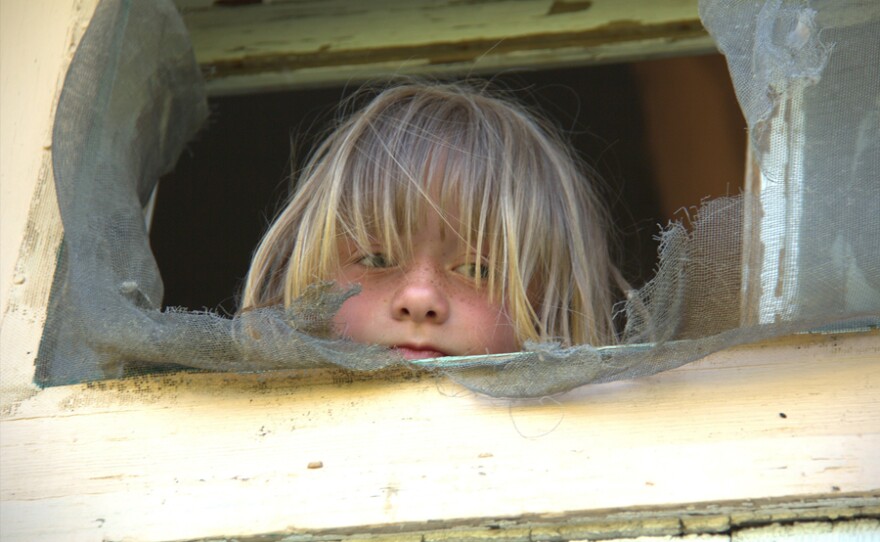As Americans prepare to celebrate Thanksgiving, one in five of the nation’s children are living below the poverty level. One in 45 is homeless.
In "Poor Kids," FRONTLINE travels to the Quad Cities, a great American crossroads along the border of Iowa and Illinois, to explore the lives of children living in the suburbs of the nation’s heartland and growing up poor.
Told from the point of view of the children themselves, this one-hour documentary offers a unique perspective on the nation’s flagging economy and the impact of unemployment, foreclosure and financial distress as seen through the eyes of the children affected.

For 10-year-old Kaylie, the hardest part of dealing with her family’s financial difficulties is ignoring the gnawing hunger in her stomach. “I’m just starving,” she says. “We don’t get that three meals a day, like breakfast, lunch, and dinner.”
Her brother, Tyler, 12, agrees. “Sometimes when we have cereal, we don’t have milk, so we have to eat it dry,” he says. “Sometimes … when there’s a cooking show on, I get a little more hungry, and I want to vanish into the screen and just start eating the food.”
Kaylie and Tyler’s mother, Barbara, earns $1,480 a month. Rent and utilities consume $1,326 of that, leaving little money for food or gas.
To help her mother, Kaylie spends her free time collecting cans. “I just walk around, look for cans. I walk around the whole town,” she says. “The non-squished ones are five cents.”
Kaylie worries about missing so much school as a result of her family’s transient existence.
She also shares her fears about the precarious state of her family’s finances: “When we can’t afford to pay our bills, like our house bills and stuff, I’m afraid that, like, we’ll get homeless and me and my brother will starve.”
It’s a fear that 9-year-old Brittany understands all too well. After her father lost his job, Brittany lost her home.
Her family bounces from one relative’s couch to another’s before finally ending up in a dilapidated house on the edge of the Quad Cities.
“One day I started getting in the shower, and it was cold,” she recalls. “It was like, freezing. It felt like shoving your face in snow. The hot water shut off because we didn’t pay the bill in time. It was overdue.”
Brittany and her brother, Roger, lost many of their cherished possessions when the family could no longer make payments to the storage company holding their belongings.
“I was surprised by how things can change so fast,” Roger says. “You can go from doing OK, not having to go hungry, to this: going hungry and having to pay all your bills and not being able to [buy food], on the verge of being homeless again.”
In "Poor Kids," Brittany learns her mother is expecting another baby. The 9-year-old is fearful about how they’ll manage to feed and care for an infant as another Midwest winter draws near, bringing with it potentially crippling utility bills. “We always manage, don’t we?” her mother asks. “Know why? We’re survivors: Struggle, survive, and smile.”
Related Articles
By the Numbers: Childhood Poverty in the U.S. by Jason M. Breslow
Jezza Neumann on Making the Film & Helping the Kids by Azmat Khan
Sera’s Story: Growing Up Poor in San Francisco by Sarah Moughty
Map: Where is Childhood Homelessness Getting Worse? by Jason M. Breslow
Live Chat Transcript — Helping America’s Poor Kids by Nathan Tobey
What Does Poverty Mean to Children? by Sandy St. Louis
WATCH ON YOUR SCHEDULE:
Past episodes of FRONTLINE are available for streaming on demand.
JOIN THE CONVERSATION:
FRONTLINE is on Facebook, Instagram, tumblr, and you can follow @frontlinepbs on Twitter. #frontlinePBS
This episode originally aired in 2012.
CREDITS:
A FRONTLINE production with True Vision. The producer, writer and director is Jezza Neumann. Lauren Mucciolo is the co-producer. The executive producer for True Vision is Brian Woods. The deputy executive producer of FRONTLINE is Raney Aronson-Rath. The executive producer of FRONTLINE is David Fanning.





